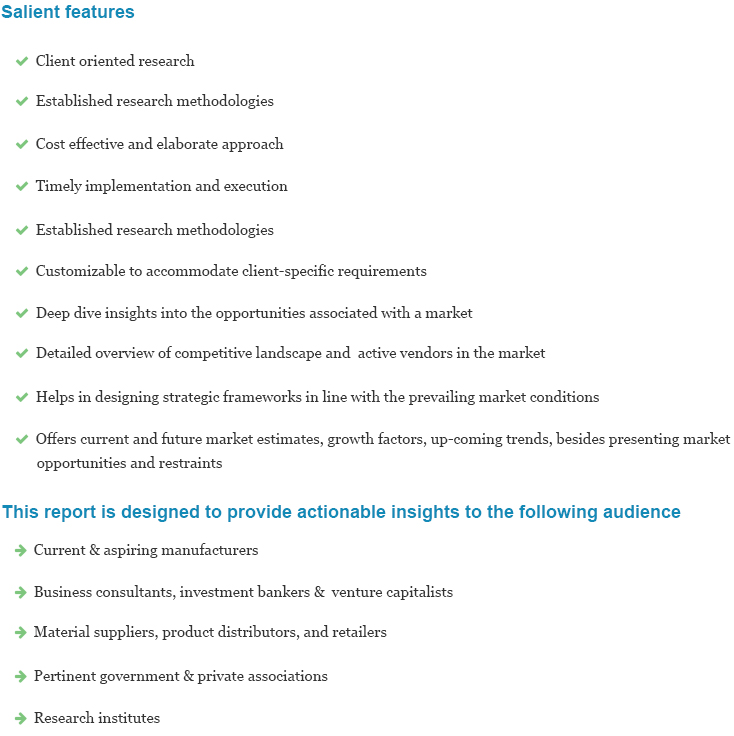
Remote Sensing Market Analysis, Market Size, Application Analysis, Regional Outlook, Competitive Strategies And Forecasts, 2019 To 2025
- Published: February, 2019
- Format: Electronic (PDF)
- Number of pages: 70
- Industry: Sensors & Controls
The global remote sensing market is likely to expand significantly in the coming years on account of growing need for remote sensing services in defense and commercial applications. Additionally, need for real time information and increasing demand in homeland security services are expected to support market growth in the coming years.
Furthermore, growing trend of cloud computing and implementation of big data analytics in remote sensing services are likely to create growth opportunities for the market. Technological advancements, such as digital sensors, for remote sensing can detect the Earth’s surface over large areas and send the data to the ground stations. In addition, introduction of inflatable SATCOM antennas that are designed for ground military applications in distant areas and extreme weather conditions is one of the crucial developments in the military sector. These antennas are positioned at sites where deployment of standard and rigid satellite antennas is not applicable.
However, requirement of high initial investments, along with presence of strict regulatory framework, is expected to limit market growth in the coming years. In addition, lack of awareness and issues related to interoperability can challenge the market.
Remote sensing can be operated through different platforms, such as satellite and unmanned aerial vehicle (UAV). Satellites is anticipated to dominate the market due to high demand for earth observation satellites. These satellites are designed to monitor Earth’s surface to obtain important information for various purposes, such as civil planning, climate change monitoring, weather forecasting, and military inspection. Further, commercial satellites are extensively used for obtaining remote sensing imagery, building site selection and development, real estate appraising, communications infrastructure planning, damage assessment for insurance claims, and oil and gas exploration. Introduction of small satellites is also expected to widen the application scope of remote sensing services in the years to come. UAV is anticipated to exhibit a high CAGR in the years to come. UAV-based remote sensing services are used for real-time assessment and large-scale mapping. They are also increasingly employed for monitoring applications, such as 3D terrain model construction, precision farming, geohazard mapping, damage assessment, and mineral mapping. Increasing demand for lightweight UAV payloads owing to applications of UAVs in urban areas for remote sensing operations is one of the key trends in the market. Use of carbon composite materials in the manufacturing of UAV airframes can reduce their weight and improve service life.
North America is likely to dominate the market in the coming years due to high adoption of remote sensing services. High implementation of these services in a wide range of applications, such as exploration of mineral, oil, and gas, weather forecasting, oceanography, scientific research, and earth observation. These services are also used in industries, including energy and power, forest, and agriculture. Additionally, increasing use of these services for gathering multi-source images that are used in Geographic Information Systems (GIS), environmental monitoring, and damage assessment can boost regional growth in the coming years. Rising participation of the U.S armed forces in international operations is anticipated to augment the demand for multirole UAVs in future.
Asia Pacific is anticipated to witness momentous growth in the years to come on account of increasing implementation of remote sensing in precision farming and geohazard mapping. The market in Europe is expected to expand significantly on account of continuous developments in the usage of new frequencies and signal transmission techniques. Increasing investments in military and commercial satellites programs by countries, including France, Russia, Germany, U.K., and Israel, are expected to support regional growth.
Some of the key players operating in the remote sensing market are The Airborne Sensing Corporation, Satellite Imaging Corporation, Antrix Corporation, Terra Remote Sensing, and Mallon Technology.
In 2018, China has successfully launched two remote sensing satellites, both belonging to the Yaogan-32 family. They were launched by a Long March-2C rocket attached with an upper stage. These satellites are designed for electromagnetic environment surveys and other related technology tests.

Choose License Type
- World's largest premium report database
- Transparent pre & post sale customer engagement model
- Unparalleled flexibility in terms of rendering services
- Safe & secure web experience
- 24*5 Research support service
